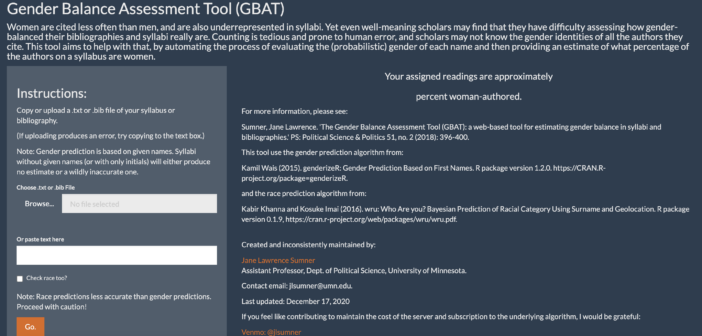Lehigh’s political science department is using a Diversity, Equity & Inclusion resource called the Gender Balance Assessment Tool (GBAT). The department is currently in the process of establishing a committee for the development of DEI initiatives.
The GBAT, created by University of Minnesota Twin Cities Professor Jane Sumner, detects author names within a syllabus and runs them through two different algorithms, one for gender and one for race.
Sumner developed the system in the spring of 2016 at Emory University.
Sumner said the purpose of this tool is to ensure there is gender diversity among the readings in a given syllabus. She said it is a web-based tool that serves to help scholars assess the gender balance of their syllabi and bibliographies.
“Because researchers tend to cite, at least initially, the works assigned to them in coursework, the gender gap in citations is exacerbated by under-assignment in syllabi,” Sumner said.
Associate Professor of Political Science Holona Ochs said the GBAT tool checks for gender and racial diversity, but that these are blunt instruments.
“Gender is a spectrum, and racial identities are complex and multifaceted,” Ochs said.
Ochs said she has encouraged her colleagues to use Sumner’s tool, though no one is compelled to do so. She said she hopes it becomes standard practice.
Sumner said she is determined to spread awareness about the gender gap that is often overlooked in academia.
“The aim is to make assessing gender diversity so easy and quick that more scholars will do it,” Sumner said.
Associate Professor of Political Science Nandini Deo said multiple faculty members within the Political Science Department have shown interest in forming a DEI committee. This committee would determine the best practices for inclusion and how to apply them within the classroom.
Deo said the department has discussed the process of selecting more diverse readings for their syllabi. She said they are focused on creating more variety in the readings they select, while prioritizing race, gender and country diversity.
“I hosted a workshop for faculty in the department,” Deo said. “A big part of what we talked about was how to select readings and texts that are more diverse, both in terms of gender, race and from different parts of the world.”
Anthony DiMaggio, associate professor of political science, said incorporating the GBAT tool into the political science curriculum would be a good starting point for improving the diversity of syllabus readings.
“This database would be useful as a conversation starter, but it can’t be the endpoint,” DiMaggio said. “It has to be deeper than just what the race and gender of the authors are. We have to look at the content too.”
Ochs said many universities are implementing DEI initiatives into their curricula, and she feels Lehigh is behind the curve.
She said DEI concepts will continue to be undervalued until faculty are systematically evaluated on those criteria.
“True excellence cannot be achieved without diversity,” Ochs said.
Sumner said her GBAT tool has received some backlash over the years, including hate mail that was sent to her office.
She said the majority of the hate mail she receives is from people claiming that she is trying to eliminate white men from academia.
Sumner said the GBAT system also receives positive feedback, and she has received suggestions on how it can be improved.






Comment policy
Comments posted to The Brown and White website are reviewed by a moderator before being approved. Incendiary speech or harassing language, including comments targeted at individuals, may be deemed unacceptable and not published. Spam and other soliciting will also be declined.
The Brown and White also reserves the right to not publish entirely anonymous comments.
1 Comment
Perhaps syllabuses should be name blind such that the content is based upon its quality versus selection based upon anything other than merit.
DEI is a trap that Universities should avoid.